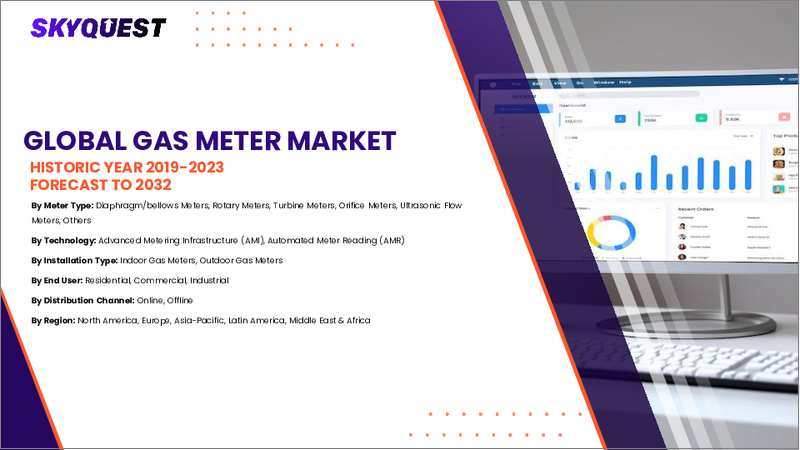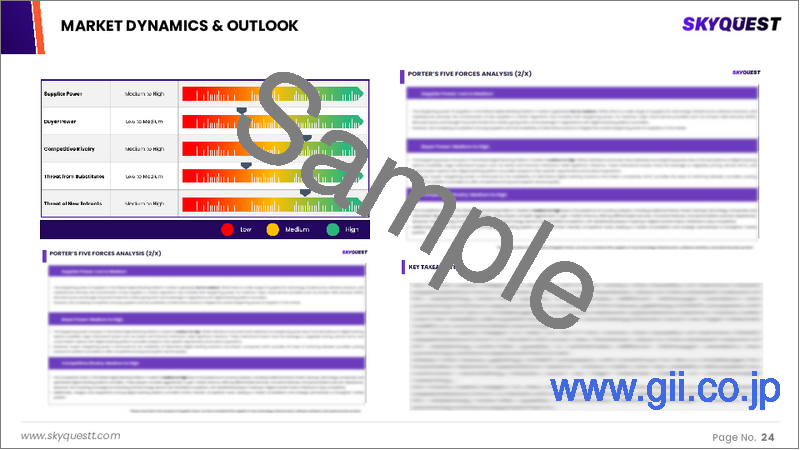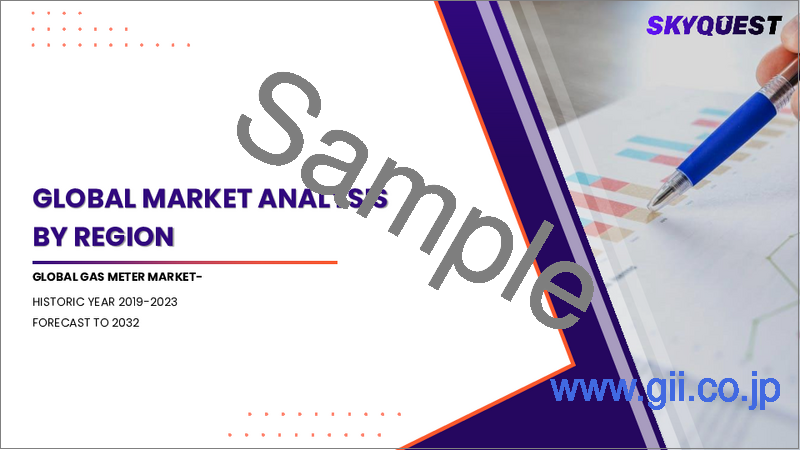|
|
市場調査レポート
商品コード
1907439
ガスメーター市場規模、シェア、および成長分析:タイプ別、用途別、地域別-業界予測2026-2033年Gas Meter Market Size, Share, and Growth Analysis, By Type (Basic Gas Meter, Smart Gas Meter), By Application (Residential, Commercial), By Region - Industry Forecast 2026-2033 |
||||||
|
|||||||
| ガスメーター市場規模、シェア、および成長分析:タイプ別、用途別、地域別-業界予測2026-2033年 |
|
出版日: 2025年12月19日
発行: SkyQuest
ページ情報: 英文 156 Pages
納期: 3~5営業日
|
概要
ガスメーター市場規模は2024年に37億3,000万米ドルと評価され、2025年の39億米ドルから2033年までに56億4,000万米ドルへ成長する見込みです。予測期間(2026-2033年)におけるCAGRは4.7%と予測されています。
ガスメーター市場は、天然ガス消費量の増加とスマートメーター導入促進に向けた積極的な取り組みに牽引され、著しい成長を遂げております。天然ガスがエネルギー消費に占める割合が高まるにつれ、正確かつ効率的な計測ツールへの需要が急増しております。しかしながら、この業界は資本集約的であるため、革新的な技術導入に必要な多額の投資が障壁となり、新規参入には課題が生じております。遠隔検針や双方向通信といった先進機能を備えたスマートメーターは、高度なネットワークモジュールとデータ処理能力を内蔵しているため、従来型製品よりも製造コストが高くなります。これらの革新技術により、公益事業者はエネルギー配分の効率的な管理、ピーク需要への対応、潜在的な問題の早期発見が可能となり、同時に相互接続されたIoTエコシステムを構築することでエネルギー管理の高度化が促進されます。
ガスメーター市場の促進要因
ガスメーター市場の成長を推進する重要な要因は、スマートガスメーターの普及拡大です。リアルタイム監視の実現、遠隔検針の可能化、精度向上といった特長から、これらの先進的なメーターは顧客とエネルギー供給事業者の双方で支持を集めています。エネルギー効率の向上、コスト削減、請求プロセスの効率化への需要がスマートメーターへの移行を牽引しています。技術の進歩に伴い、スマートメーターのコスト低下が進み、より入手しやすくなっております。さらに、公益事業者に与えられる運用管理の強化、エネルギー浪費の最小化の可能性、顧客サービスの向上といった点も、スマートメーターの採用を促進し、市場拡大を後押ししています。
ガスメーター市場の抑制要因
ガスメーター市場は、設置に伴う高額なコストが成長の妨げとなるため、重大な課題に直面しています。多くの家庭や中小企業にとって、ガスメーター、特にスマートメーターに必要な初期投資は、非常に高額で導入が困難な場合があります。この財政的障壁が先進的なガスメーター技術の採用を阻害し、最終的に市場拡大を制限する可能性があります。さらに、信頼性の高い通信ネットワークやその他の支援インフラの必要性が、設置費用をさらに押し上げる可能性があります。これらの初期費用が膨大なため、利益の実現には相当な時間を要し、ガスメーターの普及を複雑にします。加えて、設置費用は設置場所やメータータイプによって変動するため、市場浸透の複雑さを増しています。
ガスメーター市場の動向
ガスメーター市場は、IoTとクラウドコンピューティング技術の融合による影響をますます受けており、測定精度と運用効率が向上しています。この統合により、IoT対応ガスメーターを通じたリアルタイム監視と遠隔管理が可能となり、データをクラウドにシームレスに送信して高度な分析が行えます。公益事業者はこのデータを活用し、使用パターンの検出、漏洩の特定、配給ネットワークの微調整を行い、最終的にサービス提供を強化します。スマートガスメーターの需要拡大に伴い、公益事業者はエネルギー浪費の削減と運用パフォーマンスの向上という恩恵を得られる態勢にあります。IoTとクラウドソリューションの継続的な進化は、ガスメーター分野におけるこれらの技術の応用をさらに深化させると予想されます。
よくあるご質問
目次
イントロダクション
- 調査の目的
- 定義
- 市場範囲
調査手法
- 情報調達
- 二次情報及び一次情報の情報源
- 市場規模予測
- 市場の前提条件と制限
エグゼクティブサマリー
- 見通し
- 供給需要動向分析
- セグメント別機会分析
市場力学と見通し
- 市場力学
- 促進要因
- 機会
- 抑制要因
- 課題
- ポーターの分析
主な市場の考察
- 技術分析
- バリューチェーン分析
- 市場のエコシステム
- ケーススタディ分析
- 規制情勢
- イノベーションマトリクス
- 主な投資の分析
- 主な成功要因
- 競合の程度
- 特許分析
ガスメーター市場:タイプ別
- 基本型ガスメーター
- スマートガスメーター
- スマート超音波式ガスメーター
- スマートダイヤフラム式ガスメーター
ガスメーター市場:用途別
- 住宅用
- 商業用
- 産業用
ガスメーター市場規模:地域別
- 北米
- 米国
- カナダ
- 欧州
- ドイツ
- スペイン
- フランス
- 英国
- イタリア
- その他欧州地域
- アジア太平洋地域
- 中国
- インド
- 日本
- 韓国
- その他アジア太平洋地域
- ラテンアメリカ
- ブラジル
- その他ラテンアメリカ地域
- 中東・アフリカ(MEA)
- GCC諸国
- 南アフリカ
- その他中東・アフリカ地域
競合情勢
- 上位5社の比較
- 主要企業の市場ポジショニング(2025年)
- 主な市場企業が採用した戦略
- 市場における最近の活動
- 主要企業の市場シェア(2025年)
主要企業プロファイル
- Siemens AG(Germany)
- Badger Meter, Inc.(US)
- KROHNE Group(Germany)
- Schneider Electric(France)
- Apator SA(Apator Group)(Poland)
- Endress+Hauser(Switzerland)
- Diehl Metering GmbH(Diehl Group)(Germany)
- ABB(Switzerland)
- Aichi Tokei Denki Co., Ltd.(Japan)
- Chongqing Shancheng Gas Equipment Co., Ltd.(China)
- Zenner International GmbH & Co. KG(Germany)
- Flonidan A/S(Denmark)
- EMH metering GmbH & Co. KG(Germany)
- Badger Meter, Inc.(US)
- Wasion Group Holdings Limited(Star Treasure Investments Holdings Limited)(China)
- Meter Italia S.p.A.(Italy)
- Holley Technology Ltd.(Holley Group)(China)
- Pietro Fiorentini S.p.A.(Italy)
- Raychem RPG Pvt. Ltd.(India)






